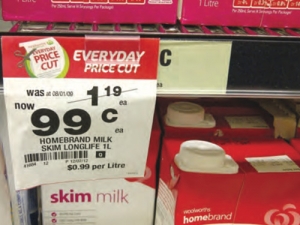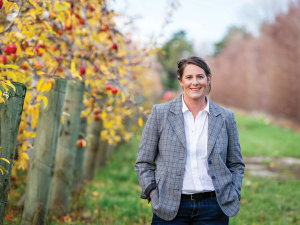The month has been challenging for Australian dairying, the two largest companies' milk price revisions having hit many southern producers in the short term.
The sudden realignment of local farmgate prices with the realities of a depressed global commodity market will cause low milk prices to affect many more dairy producers in the new season.
The news stories almost seamlessly and inevitably moved from Murray Goulburn, Fonterra and commodity markets to evil supermarkets and A$1/L milk.
For those of us called on as 'experts' to shed light on the hardships facing dairy farmers there was an awkward moment when two barely related issues were collapsed into one.
In the monologues and sound bites that followed in the ensuing weeks, as the search for 'the villain' has moved from dairy companies to retailers, these nuances have become lost and the community has become more interested in 'what we can do to help'. This has been encouraged by grassroots social media efforts by dairy farmers themselves.
The message has gone out to consumers: buy branded products, pay a little extra and you can do your bit. In the age of the quick grab, it's pretty tough to say much more.
Perhaps a silver lining to this dairy crisis is the groundswell of consumer support for farmers doing it tough. It has been heartening to see images of supermarket fridges emptied of branded product, while store-brand products were left on the shelf.
A widely reported, though small, survey of 260 people by market researcher IMI International found 78% believed selling A$1/L milk at Coles and Woolworths had played a role in the current dairy pricing crisis.
Further, 74% said they were aware dairy farmers were facing a crisis after large manufacturers reduced the price they were willing to pay their milk suppliers.
The survey found 66% of people are "prepared to pay more for their milk if it helps our local dairy farmers".
For the major supermarket chains, caught in a downward price spiral of intense competition, it has been a strong message from shoppers. People were not simply choosing the cheapest, they were choosing products they believe will put more dollars in dairy farmers' pockets.
Could this force a rethink and a backing away from a strategy that has been entrenched and successful for Coles for five years? Time will tell. Certainly Coles badly misjudged the situation with their announcement of a new brand to yield an extra 20c/L for an industry support fund.
The move has been condemned as a cynical PR stunt, although similar initiatives were sought and welcomed in South Australia and Western Australia.
On this occasion, apparently without any industry collaboration, it was a definite fail.
On the flipside, a concerted effort to buy branded milk, even over a long time, is unlikely to have a material impact on the financial situation now faced by dairy farmers – mostly in southern regions – affected by the farmgate price cut.
Will realising this cause observers and consumers to question what they have been told?
Consumers are responding to attributes of farmers they admire and value: authenticity, dignity, salt of the Earth.
Care is needed to acknowledge and encourage consumers choosing to spend more on milk, but not mislead them as to the cause of or cure for the hardship dairy farmers are feeling. While retailers and A$1/L milk have not been part of the 'solution', neither are they the whole problem.
This current situation highlights that this industry is part of a global market for dairy products, with a limited ability to insulate itself from the realities of demand and supply.
Volatility in farmgate prices is nothing new for dairy or any other exporting sector. As Murray Goulburn has shown, it can't be completely traded away – and it won't be regulated away either, even in an election year.
There are no walls around our domestic market; consumers here and worldwide can choose which dairy products they buy, or whether they buy dairy at all.
A 'thank you' to consumers motivated to send a message of empathy and validation to dairy farmers by their purchase decisions has been a wonderful thing. However, dreaming up fresh crises to garner attention and keep the sympathy rolling is not the way forward.
The industry has an opportunity to put choices in front of consumers that address their demands for healthy, innovative, ethical products.
Consumers have shown, in this instance and in their response to A2 Milk, that price is not always the issue; they will pay more, for longer, if they feel they derive a benefit from doing so.
If shoppers want it and value it, and the industry can deliver it, retailers have no choice but to respond. It could even be a good-news story for the entire dairy supply chain, rather than a two-week media blitz.
Joanne Bills is a director of Australian food consulting firm FreshAgenda.










